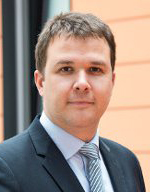Clinical Epidemiology Fellowship
The Clinical Epidemiology Fellowship a variation of the standard Virchow Fellowship. It is an offer for postdoctoral scientists, mainly of medical background, to become eligible for an academic career position, i.e. junior group, junior professorship, in clinical epidemiology. The prerequisite for this perspective is a degree in epidemiology. This degree will be acquired as part of the Fellowship.
Structure of the Fellowship
The Fellowship has similar components as the standard Virchow Fellowship, the major difference being the course program. The four pillars upon which the program is built are:
- Clinical Training
- Research
- Master study program for Epidemiology (MSc)
- Mentoring and evaluation
The Fellow will be integrated in the working group of Clinical Epidemiology, headed by Prof. Dr. Philip Wild, allowing easy access to resources, projects, data and biomaterial as well as the network of the group.
The Fellowship offers a contract as a physician according to the trade agreement level TV-Ä1 for 2.5 years, a small budget for resources and coverage of the tuition fee for the Master program.
1. Clinical Training
The training in internal medicine for fellows with medical background with specialization in cardiology will be located at the Department of Medicine 2. The necessary rotations needed to achieve clinical specialization will be defined by an agreement between the CTH and the Department of Medicine 2 to ensure provision as planned.
Prerequisite: German Language Certificate B2
Duration: 6 – 7 years (aim: Board Certification)
Time: During the fellowship, clinical training will take up max. 50% of the working time (20.5 hours per week).
2. Research
A dedicated scientific working plan has to be developed which is linked to the working program of the CTH Clinical Epidemiology. Based on the work plan, resources to carry out the planned research will be provided by the CTH. Additional funding can be activated via grants from third party funding or the translational research program (TRP) of the CTH.
Duration: Max. 2.5 years (full time) or 5 years part-time (50%) (aim: habilitation)
Time: During the fellowship, 25% of working time (10.5 hours per week), for fellows with natural science background: up to 75% of working time.
3. Master study program for Epidemiology (MSc)
The program is carried out in Mainz; all courses are taught in English. The program is based on a European network of institutions with ECTS (European credit transfer system). The program consists of 3 core modules, 9 elective modules (4 have to be completed), a master thesis and a final exam. More information about the study program can be found here.
Tuition fee: Covered by the fellowship
Master thesis: Will be linked with the working program within the CTH
Duration: 2.5 years (aim: Master Certificate)
Time: 25% of working time (10.5 hours per week)
4. Mentoring and evaluation
Individual mentoring will be provided by the professorship for Clinical Epidemiology and the career support structures of the Virchow Fellowship Program.
Contact

Professor Philipp Wild, MD, MSc
Preventive Cardiology and Medical Prevention, Professorship „Clinical Epidemiology“, Coordinator Gutenberg Health Study (GHS), Principal Investigator Deutsches Zentrum für Herz-Kreislaufforschung (DZHK)